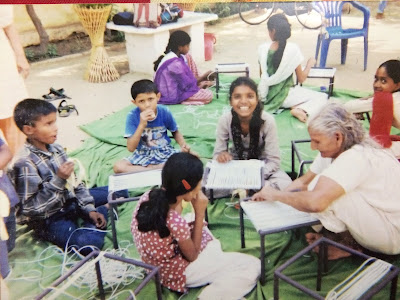This week we have Ms. Binti Shrivastava who writes about
Skilling Women and Making them Financially Empowered.
Ms. Binti is a physics undergraduate, but found her calling in design moving into textile design and then becoming an adept in interior design. She is an Alumni of the Women's Polytechnic of Dayalbagh Educational Institute (DEI) before joining them as honorary staff.
Ms. Binti writes...
India is progressing at a very fast pace, however at macro
level the policy makers have shown their deep concern with regards to
inadequate gross enrolment ratio in higher education specifically for women in the latest National Education Policy (NEP) 2017.
In Dayalbagh over hundred years back, education system for
women was planned and started which now integrates education for women from
pre-nursery to post-doctoral studies. Some milestones of evolution of women’s
education system in Dayalbagh are:
In Dayalbagh, skill development
programmes for women can be traced back to 1924 when diploma courses were
started for women in cooking, knitting, sewing, embroidery, science of health
and hygiene and child care. In 1938, another step forward in this
direction was taken by bringing "Mahila Associations" into existence where women
in groups started manufacturing of clothes, spices, eatables like pickle, fruit
concentrates etc.
 |
| Inaugural on 26th July 2004 |
With the aim of improving the socio-economic status of women, Women’s
Polytechnic started in 2004 to offer job oriented courses to women with the
concept of no barriers in terms of caste, creed, religion or even age.
2004
DEI Women’s Polytechnic was inaugurated on 26th
July 2004 by Most Revered Professor Prem Saran Satsangi Sahab, Chairman
Advisory Committee on Education, Dayalbagh. In the year of inauguration one
year certificate programmes in Food Processing & Preservation, Dress
Designing & Tailoring, Textile Designing & Printing, Interior-Exterior
Design & Decoration and Office Management & Secretarial Practice were
started.
2005
From 2005-06, the Women’s Polytechnic was declared as
a women’s wing of the DEI Technical College and 3-year Diploma courses were started
in Electronics Engineering, Interior Designing & Decoration and Textile
Printing. Also 2-year diploma courses were started in Garment Technology, Modern
Office Management & Secretarial Practice and Food Processing, Preservation
and Nutrition.
2006
DEI ever since its beginning had a concept of lateral
movements there by giving chance to brighter students to move to the highest
level of education. The same was extended to the students of Women’s Polytechnic
as well. The students of one-year certificate programme on the basis of their
academic merit were allowed to make a lateral shift to the corresponding
diploma programme after successfully clearing the lateral entry test.
2008
Two National Workshops on False Ceiling & Flooring were
organised by the Department of Interior Design & Decoration which had wide
industry participation there by giving an exposure to its students on the
latest technology and trends in the world.
2009
Lateral movement was further extended to the students of
diploma in electronics engineering directly to B.Tech after successfully
clearing the lateral entry test and doing short term bridge courses in order to
be at par with the B.Tech students.
2010
National workshop GARTEX-2010 was organised by Department of
Textile Designing and Department of Garment Technology on the latest trends in
the field of textile designing and garment technology.
2012 & Beyond
A new 3-year diploma programme in Architecture Assistantship
was started in 2012 which also offered lateral shift to B.Tech. Further new
courses on Vocational diploma in Automobile and Information Technology were
started. These programmes also have an option of lateral movement to higher
degree programmes.
Open & Distance
Learning Mode
DEI had ventured into open and distance learning (ODL) since
2004 and to extend its women empowerment drive beyond its campus commenced
offering the courses of Women’s Polytechnic as well in ODL mode. Further to
have greater flexibility the concept of modularisation of courses was
envisioned and in 2014 the courses of Women’s Polytechnic were converted into 9
week modular courses offering flexibility of completing modules there by
earning course credits and upon completion of required modules and credits for
a certificate/diploma the students are granted an appropriate
certificate/diploma.
 |
| First Staff of Women's Polytechnic |
Community Outreach
In 2014 in the tribal belt of Harda district in MP in village
Rajaborari, with a vision to set up REZ (Rural Economic Zone), the Women’s
Polytechnic moved forward in setting up of ADyNaM (Agriculture & Dairy Nano
Processing of Multi Products) and ATMA (Apparel & Toy Making Association).
These efforts were made in order to train the women from the weaker section
with various skills which generate self confidence in them and make them
self-sufficient to earn a sustainable livelihood.
 |
| Management, Coordinators and Staff of Women's Polytechnic |
Placements
Students of different programmes of Women’s Polytechnic are
widely placed in the industry because of the unique industry aligned curriculum
which has a perfect blend of theory and practical courses. Apart from this the
students have an edge over the rest due the core courses that each of our
student mandatorily takes during the course of study at DEI. Apart from being
placed in the industry, we have good number of students turned entrepreneurs
doing very well in their domains of expertise.




















